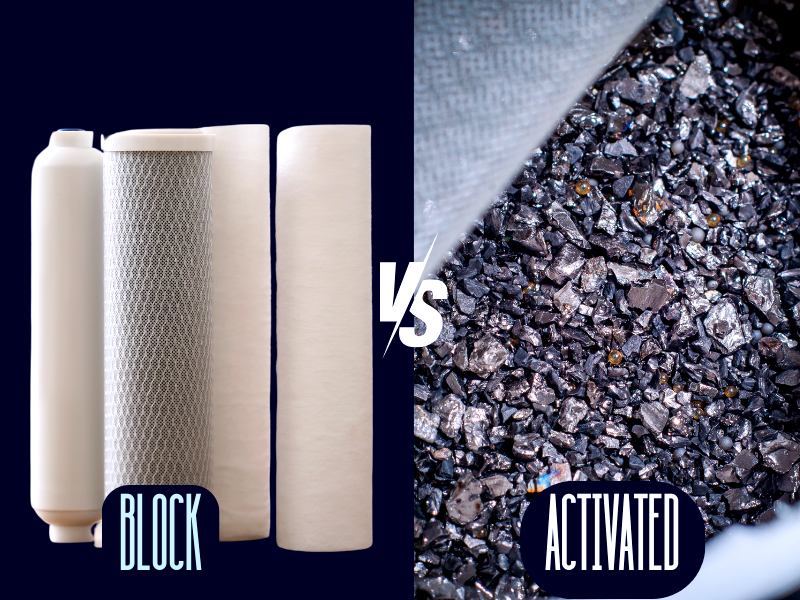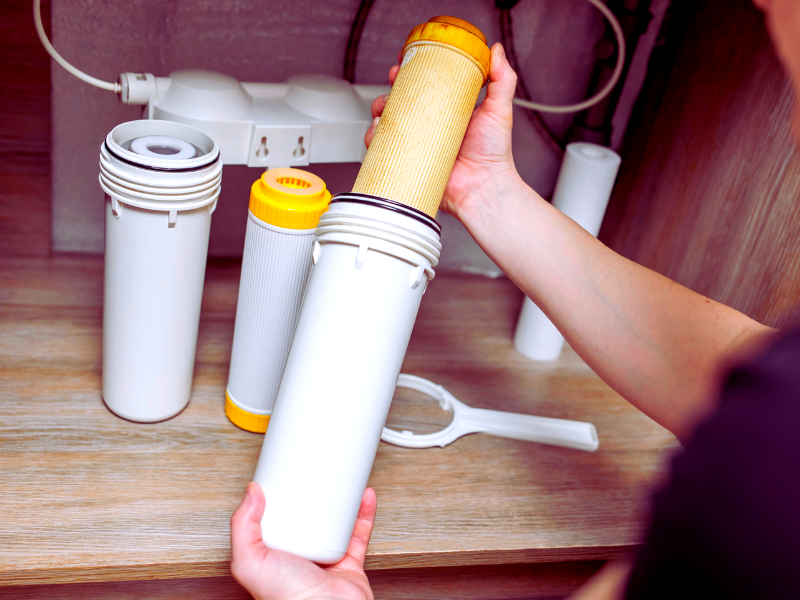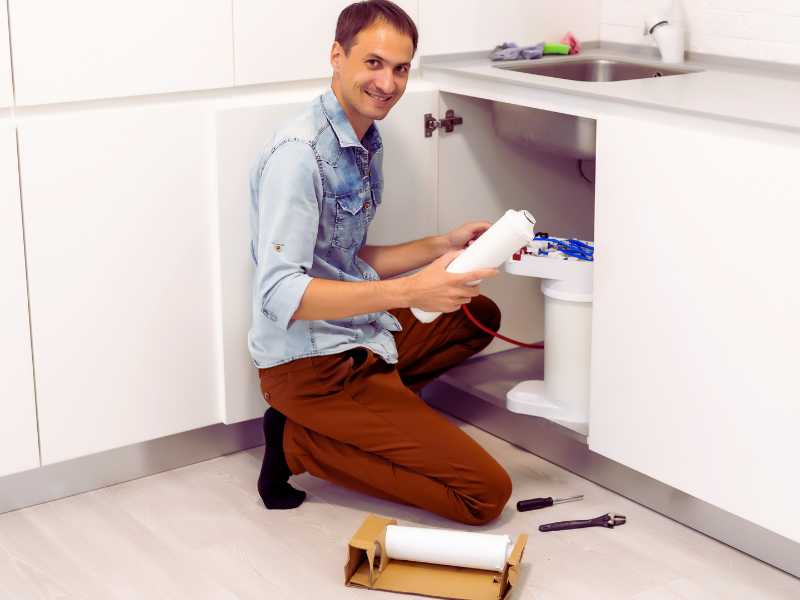Key Takeaways:
- Carbon filters typically last 2 to 6 months, depending on usage and water quality.
- Regular maintenance and timely replacement are crucial for optimal performance.
- Understanding the factors affecting the lifespan of carbon filters can help improve water filtration management.
Water filtration is critical to ensuring clean and safe drinking water. Among the various types of filters available, carbon filters are widely used due to their effectiveness in removing contaminants and improving water taste. But how long does carbon last in a water filter? This article delves into the lifespan of carbon filters, factors affecting their longevity, and tips for maintaining optimal performance.
What Are Carbon Filters?

Activated carbon filters, also known as activated carbon filters, are designed to remove impurities from water through adsorption. A type of carbon filter, the carbon block filter, is excellent at removing lead and cysts. These filters contain activated carbon with a large surface area and many air pockets that trap impurities. How activated carbon filters work involves the process of adsorption, where contaminants are attracted to and held on the surface of the activated carbon. Activated carbon filters remove chlorine, organic compounds, and some heavy metals, making them popular for water filtration.
How Activated Carbon Filters Work
Activated carbon filters work by adsorbing impurities onto the surface of the carbon particles. When water passes through the filter, impurities such as chlorine molecules, organic compounds, and foul odors are trapped in the carbon’s porous structure. This improves water quality, taste, and smell.
Factors Affecting the Lifespan of Carbon Filters
Several factors affect how long a carbon filter will last. Using a quality filter is key; high-quality filters are more durable and effective, ensuring better performance and longevity. The quality of the carbon used, the amount of water filtered, and the level of contaminants in the water all play a role. High-quality carbon filters like those made from coconut shells last longer because of their larger surface area and better adsorption.
Usage and Water Quality
Frequency of use and water quality are key factors that affect a carbon filter’s lifespan. In areas with high contaminants, filters may need to be replaced more often, while in areas with cleaner water, filters can last longer. Monitor your water quality and filter performance to determine the optimal replacement schedule.
When to Replace Your Carbon Filter

Knowing when to replace your carbon filter is important for clean water. Charcoal water filters also need to be replaced regularly to maintain water quality. Common signs are a change in water taste or smell, reduced water pressure, and a clogged filter. Visible clogging is a clear sign that the filter needs to be replaced. If you experience any of these, it’s time to replace your filter for continued water quality.
Types of Carbon Filters
There are many types of carbon filters, each for a specific use. Carbon block filters, for example, are great at removing chlorine and other impurities. Carbon water filters are part of water filtration to ensure safety and efficiency through proper maintenance and timely cartridge changes.
Charcoal water filters are another option known for improving water taste and removing impurities. These filters need to be replaced based on the filter quality, level of contaminants, and manufacturer’s recommendation. Knowing the different carbon filter types can help you choose the right one.
Maintenance and Replacement of Carbon Filters
Regular maintenance and timely replacement of activated carbon filters are important for optimal performance. Changing activated carbon filters regularly is essential to maintain their effectiveness in removing impurities from water. Most manufacturers recommend replacing carbon filters every 2 to 6 months, depending on usage and water quality. Please keep track of filter replacement dates and monitor water quality to ensure your filters are always at their best.
Cost of Replacing Carbon Filters
The cost of replacing carbon filters varies depending on the type and quality. High-quality carbon filters may be more expensive, but they last longer and filter better. Investing in good-quality filters can save you money in the long run by reducing replacement frequency and improving water quality.
Environmental Impact of Carbon Filters

While carbon filters remove impurities, they also have an environmental impact. Used filters must be disposed of properly to prevent pollution. Some manufacturers have a recycling program for used filters, which can help reduce waste and minimize water filtration’s environmental footprint.
Carbon Filters in RO Systems
Carbon filters are used with RO systems to boost water filtration. These systems remove chlorine and other impurities before the water passes through the RO membrane, resulting in a higher level of filtration for clean and safe drinking water.
Benefits of Using Carbon Filters
Using carbon filters has several benefits, including improved water taste, removal of harmful impurities, and reduced chlorine levels. These filters are also easy to install and maintain, perfect for households and businesses looking for a clean water solution.
Challenges of Using Carbon Filters
Despite their benefits, carbon filters also have some challenges. Charcoal filters, for instance, require regular maintenance to remain effective in indoor gardening environments. They can become clogged over time, reducing their effectiveness and requiring frequent replacements. Additionally, carbon filters may not remove all types of contaminants, such as certain heavy metals and microorganisms, necessitating the use of additional filtration methods.
Choosing the Right Carbon Filter

Choosing the right carbon filter involves considering water quality, usage,, and specific filtration needs. A sediment filter plays a big role in trapping dirt and debris, which is important for the carbon filter to be effective. Researching different types of carbon filters and reading reviews can help you make an informed decision. Consulting with water filtration experts can also give you valuable insights into choosing the right filter for you.
Installation and Setup of Carbon Filters
Installing and setting up carbon filters is easy. Most filters have instructions and can be attached to existing water systems. Proper installation is important for optimal performance and filter life.
Monitoring Filter Performance
Monitoring your carbon filters regularly is important for water quality. You can do this by tasting the water, smelling the water, checking the pressure, and inspecting the filter for visible signs of clogging. Keep a log of filter replacement and maintenance to track performance over time.
Advanced Filtration Systems
For those who want more comprehensive water filtration solutions, advanced systems that combine carbon filters with other filtration methods like RO or UV purification are available. These systems provide a higher level of filtration, so water is free from many types of impurities.
DIY Carbon Filter Maintenance

For those who want a hands-on approach, DIY maintenance of carbon filters is an option. This involves cleaning the filter housing, inspecting the filter for wear and tear, and replacing the filter media as needed. DIY maintenance can extend filter life and ensure water quality.
Common Myths About Carbon Filters
Several myths surround carbon filters, such as the belief that they can remove all types of contaminants or that they never need to be replaced. Understanding the limitations and proper use of carbon filters can help in making informed decisions and avoiding common pitfalls.
Summary
Carbon filters are an effective and popular choice for water filtration, offering numerous benefits such as improved water taste and removal of harmful contaminants. However, their lifespan is influenced by various factors, including water quality, usage, and filter maintenance. Regular monitoring and timely carbon filter replacement are essential for optimal performance and clean water. Keep up with the latest water filter tips and offers, and subscribe to our newsletter today!
FAQ
How often should I replace my carbon filter?
Most manufacturers recommend replacing carbon filters every 2 to 6 months depending on usage and water quality. Monitoring the water's taste, smell and pressure can help you determine the replacement schedule.
Can carbon filters remove all types of impurities?
Carbon filters can remove chlorine, organic compounds, and certain heavy metals but may not remove all types of impurities such as microorganisms. An additional filtration method is needed for complete water purification.
Is carbon filters eco-friendly?
Used carbon filters must be disposed of properly to prevent pollution. Some manufacturers have recycling programs for used filters to reduce waste and minimize water filtration’s environmental impact.








